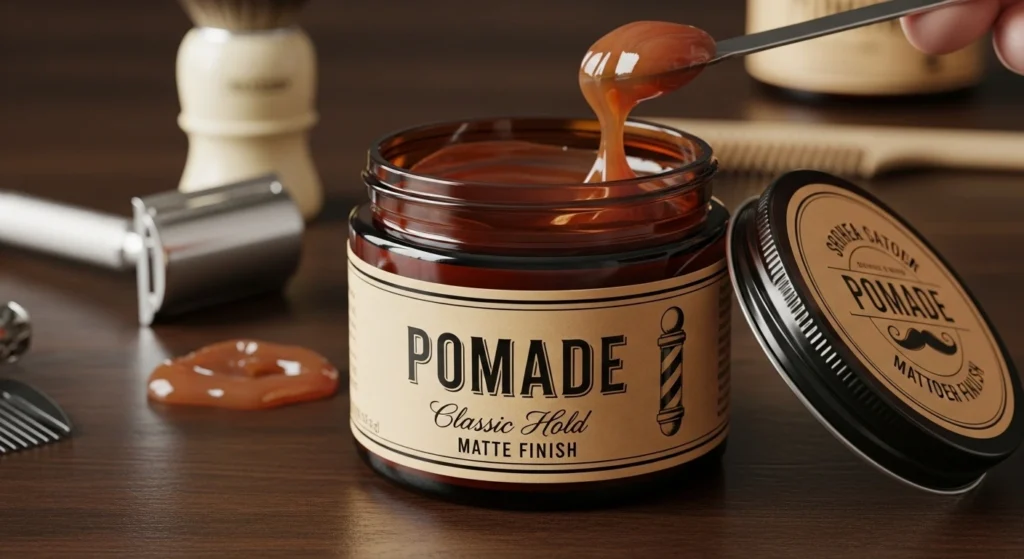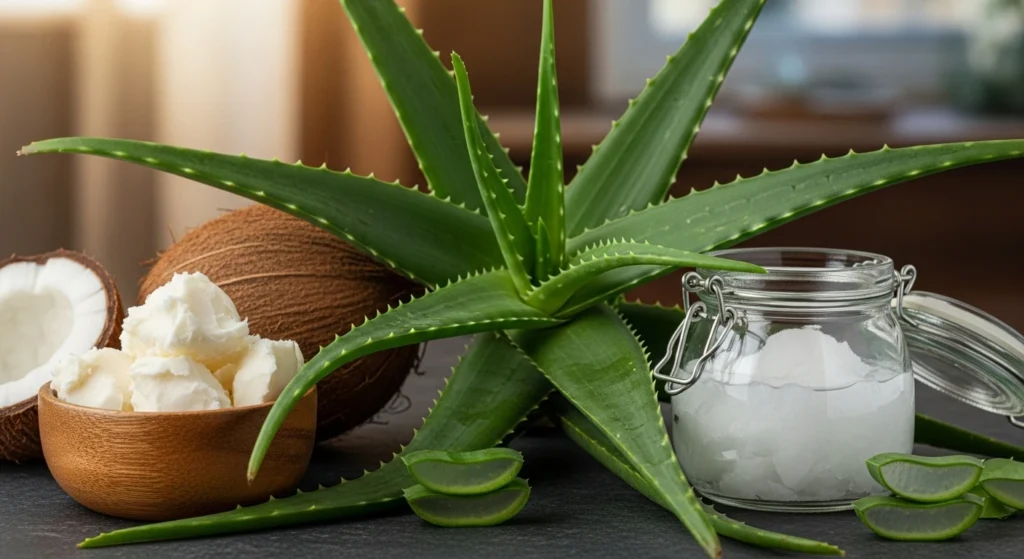Worried that Does Pomade Cause Hair Loss? It’s a common concern, especially for those who use hair styling products daily. So, does pomade cause hair loss?
This article explores the science behind pomade, how it interacts with your scalp and hair follicles, and what you can do to style safely. You’ll learn the real risks, expert recommendations, and how to maintain both style and scalp health, without sacrificing your hairline.
What Is Pomade and Why Is It Used?

Pomade is a hair styling product known for giving a sleek, shiny finish and a strong hold. It’s a favorite among people who want to sculpt hairstyles that last all day without flaking.
Types of Pomade (Oil-based vs Water-based)
- Oil-Based Pomades: Traditional formulations made from petroleum jelly or mineral oil. They provide long-lasting hold but are difficult to wash out.
- Water-Based Pomades: Modern alternatives that offer similar hold but are easier to clean. Some are labeled as “water-soluble” and leave less residue.
Common Ingredients in Pomades
- Petrolatum (petroleum jelly)
- Beeswax or lanolin
- Essential oils (fragrance)
- Alcohol-based preservatives (in some variants)
Who Typically Uses Pomade and Why
Men, in particular, use pomade for slick backs, pompadours, or classic parted looks. Women with short hairstyles or textured curls may also use it for definition and frizz control.
Does Pomade Cause Hair Loss?
The short answer: Pomade itself doesn’t directly cause hair loss, but how it’s used—and how well it’s cleaned off—can contribute to problems.
Direct Impact vs Indirect Causes
Pomade doesn’t damage hair follicles by itself. But when it builds up on the scalp, clogs pores, or causes inflammation, it can create an unhealthy environment for hair growth.
Does Pomade Clog Hair Follicles or Scalp Pores?
Yes—especially oil-based pomades. When not removed properly, they can form a waxy film that clogs hair follicles. This may cause:
- Inflammation (folliculitis)
- Itchy scalp
- Reduced oxygen supply to follicles
Role of Poor Hygiene and Overuse
- Using pomade daily without washing it out can suffocate your scalp.
- Sleeping with pomade in your hair can cause bacterial buildup.
- Layering pomade with other products (like sprays or gels) worsens clogging.
Factors That May Contribute to Hair Loss When Using Pomade
Product Buildup and Scalp Irritation
- Pomade tends to stick to the scalp.
- Over time, buildup creates an environment that supports bacterial or fungal growth.
- Chronic irritation can lead to thinning hair.
Heavy Styling and Hair Breakage
- Repeated combing and styling can cause mechanical hair loss.
- Tension from tight hairstyles can lead to traction alopecia, especially around the temples and forehead.
Allergic Reactions to Ingredients
- Fragrances or preservatives may trigger contact dermatitis.
- Symptoms: itching, redness, swelling, and eventually hair shedding.
Not Washing Hair Properly After Use
- Many users underestimate how difficult it is to fully remove pomade, especially oil-based variants.
- Incomplete washing leaves residue that accumulates over time.
Pro Tip: Use a clarifying shampoo once a week to remove product buildup and maintain scalp health.
Signs That Your Pomade May Be Causing Hair Issues
- Persistent Itching or Flaking: May indicate scalp irritation or product reaction.
- Unusual Hair Shedding After Styling: Could be from clogged follicles or inflammation.
- Thinning Hairline or Bald Spots: Early signs of traction alopecia or scalp stress.
How to Use Pomade Safely Without Causing Hair Loss
Choose the Right Type of Pomade for Your Hair
- Oily or acne-prone scalp? Opt for water-based pomades.
- Sensitive skin? Look for fragrance-free or hypoallergenic formulas.
Wash Hair Regularly and Properly
- Daily pomade users should wash their hair at least every other day.
- Use a clarifying shampoo once weekly.
- Follow with a moisturizing conditioner to restore balance.
Avoid Excessive Heat or Tight Styling
- Don’t use pomade in combination with heat tools like straighteners.
- Avoid tight ponytails, braids, or styles that pull on the scalp.
Alternate with Lightweight Products
- Let your scalp breathe by alternating pomade with lighter products like:
- Styling creams
- Mousses
- Natural oils (e.g., argan or jojoba)
Clarification on Hair Growth vs Styling Products
Pomade does not promote hair growth. Its role is purely cosmetic. Avoid pomades marketed as “hair boosters” without clinical evidence.
Common Myths Debunked
- ❌ “Pomade makes your hair grow faster.” — False.
- ❌ “Using more pomade gives better results.” — More product often means more buildup.
- ❌ “If it’s natural, it can’t harm hair.” — Natural oils can still clog pores if not washed out.
Before and After Results with Product Changes
- After 4 weeks of clarifying shampoo use + switching products:
- Reduced scalp irritation
- Noticeable decrease in shedding
- Better scalp cleanliness
Alternatives to Pomade for Healthier Hair Styling
Natural Styling Options
- Aloe Vera Gel: Lightweight, soothing
- Coconut Oil: Good for moisture, but use sparingly
- Shea Butter: Moisturizes without weighing hair down

Lighter Water-Based Styling Creams
- Easier to wash out
- Provide a hold without residue
- Suitable for most hair types
Professional Advice for Styling Without Damage
- Consult a dermatologist or trichologist if you have recurring scalp issues.
- Avoid DIY products with untested ingredients.
Frequently Asked Questions (FAQs)
Does pomade cause permanent hair loss?
No. If caught early, pomade-related hair issues are usually reversible by improving scalp hygiene and switching products.
Can pomade damage hair follicles?
Not directly. But prolonged buildup or allergic reactions can inflame follicles and cause temporary damage.
Is oil-based pomade worse than water-based?
Yes, in terms of buildup and difficulty in washing out. Water-based pomades are generally safer for long-term scalp health.
How often should I wash my hair if I use pomade?
Every 1–2 days. Use a deep-cleansing or clarifying shampoo weekly.
Should I stop using pomade completely if I notice shedding?
Yes—temporarily. Stop, assess scalp condition, and consult a specialist.
Worried About Hair Loss? Speak to Our Experts
If you’re noticing unusual hair shedding or scalp irritation after using pomade, don’t ignore the signs. Book a consultation with Dr. Rana Irfan, an ABHRS-certified hair restoration specialist in Islamabad, for a personalized scalp and hair health evaluation.
